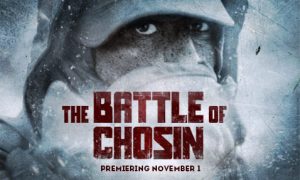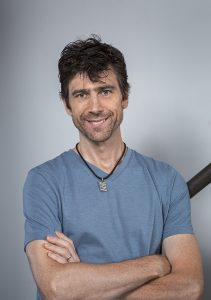Director MacLowry ’86 on the Making of PBS Documentary, “The Battle of Chosin”
 On Tuesday, Nov. 1, “The Battle of Chosin,” a documentary produced and directed by Randall MacLowry ’86, aired nationwide as part of the PBS American Experience series. In the film, MacLowry told the story of this pivotal 1950 Korean War battle—the first major military clash of the Cold War—through the eyewitness accounts and archival footage of heroic survival despite freezing temperatures and bloody battle.
On Tuesday, Nov. 1, “The Battle of Chosin,” a documentary produced and directed by Randall MacLowry ’86, aired nationwide as part of the PBS American Experience series. In the film, MacLowry told the story of this pivotal 1950 Korean War battle—the first major military clash of the Cold War—through the eyewitness accounts and archival footage of heroic survival despite freezing temperatures and bloody battle.
A film major as an undergraduate who counts Corwin-Fuller Professor of Film Studies Jeanine Basinger as a seminal mentor, MacLowry is an award-winning filmmaker whose work spans more than 25 years. His previous film for American Experience was “The Mine Wars,” which premiered in January 2016. When the producers approached him for the Chosin project last year, he accepted with alacrity, despite a fast timeline.
“It’s exciting to tell history through the eyes of witnesses,” he says. “The veterans are now in their mid-80s to early 90s; we started right away contacting them, casting a wide net. We were thrilled to find out how much the stories still resonated with them.” The team contacted about a hundred veterans and interviewed two dozen in on-camera conversations, each lasting several hours.

“The interviews were emotional,” he recalls. “Their memories are so vivid for a battle that happened more than 60 years ago, and the time of year we contacted them—late November—seemed to heighten this; it was right around the anniversary. A huge part of this battle was the cold; most have some form of frostbite. It’s a testament to these men: not only were they outnumbered by the Chinese but they survived grueling conditions.”
MacLowry’s work involved a great deal of research. “The other side of the documentary process is providing the viewer with material to visualizing it,” MacLowry explains, “and we found we had a surprisingly rich visual palate in terms of telling the story.” Working primarily from the national archives (“A hugely valuable resource”) he was also able to draw from other military sources, including the U.S. Marine archives at Quantico, as well as journalists’ photos and newsreels.
The story was also an international one. “This was the first time that the U.N. intervened in any sort of way, militarily,” he says. “It wasn’t just the United States forces, although those were the majority of the troops; it was a multinational force.” He was pleased they were able to include an interview with a South Korean veteran who was part of the South Korean Army, attached to the U.S. Marines as an interpreter who participated in this battle.
Initially not a documentarian, MacLowry said that after Wesleyan he “headed off to New York” planning to work in narrative films. After a year-long gig working on a 13-part series on American poets he found that the project “opened up my eyes to this kind of storytelling; I wanted to go down the editing path.”
He moved back to his hometown—Washington, D.C.—and began working with the late documentarian Charles Guggenheim. “Documentary film-making has been a constant learning experience for me; It’s the intersection of my film major and my exploration of a potential CSS major in my sophomore year.
“I’ve been blessed with several wonderful mentors,” he says. “From the start, being mentored by Jeanine Basinger and having her support—it really shaped my career. I feel honored to be part of the Wesleyan film community. And having Jessie Napier ’14 as our production assistant is an important part of continuing this Wesleyan experience.”

Napier, also a Wesleyan film major, adds, “”The process of working on this film has really opened my eyes to the fascinating world of historical documentaries. There’s something extremely rewarding about digging through thousands of archival images and piecing together moments from more than 60 years ago. It’s a unique experience being able to immerse yourself in a specific moment in history. It was amazing to be part of a creative team committed to sharing the stories of these veterans who have lived through such a harrowing experience.”
“I feel it’s an important group of people whose story we’ve told,” MacLowry concurs. “So often called a ‘forgotten war,’ the Korean War actually shaped our national policies. When the Chinese entered the conflict full force, it shifted the American stance toward becoming the’ police of the world’—rightly or wrongly—dedicating much more money into defense build up, with military bases across the globe. America’s containment policy began with this war, in 1950.
“When I watch the film now, there are still several moments with the men, the emotions they share with us about their experiences, I still get choked up. We’re in a sense reliving it with them. There’s a real dignity in the way each man shares his story—an appreciation for what he did, of his survival despite the horrors of war that he endured. They feel proud of what they did, and also deeply aware of what they lost—on a personal level—by being engaged in the war. To be able to do right by them, that was my goal.”

